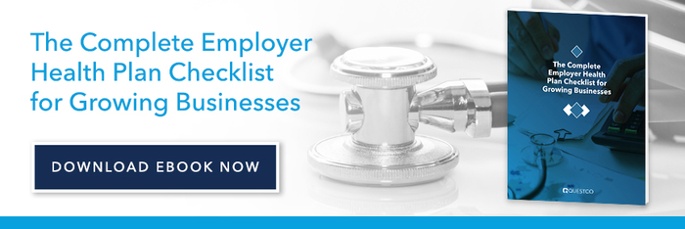Topic Employee Benefits
Should Your Company Offer Vision and Dental Insurance?
.jpg)
April 1, 2021 | By Derek Carlstrom
.jpg)
Crafting an excellent benefits package is a vital component of your business's growth, success, and profitability. Unfortunately, many business owners purchase subpar health packages that lack critical features like dental and vision.
This is a mistake.
Here are four key reasons your business should consider investing in vision and dental insurance, and how it can impact your bottom-line.
Recruitment and Retention
In a world where 83% of HR professionals are struggling to secure high-quality talent, finding ways to make your company attractive to applicants and existing employees is top-of-mind for business owners. While there are plenty of ways to improve your company’s attractiveness on the job market (e.g., cultural changes, perfect payroll administration, safety, etc.), benefits stand out as one of the quickest and easiest ways to generate attention. Sixty percent of employees admit that benefits are "extremely" important in whether they stay at their jobs, and more than 50 percent of employees have left a job to find better benefits. In fact, 78 percent of employees that stay at their jobs cite benefits as the primary driver for their loyalty.
Dental and vision play a significant role in both retention and recruitment. A Harvard Review study suggested that health, vision, and dental were the three most sought-after benefits, beating out flexible hours, vacation time, and work-from-home options. In other words, dental and vision aren't just valuable for employees; they help your business find and retain talent. They even impact your bottom-line productivity.
Productivity
Mental and physical health accounts for over 80 percent of productivity drain in the average business. Trying to create high-quality work that's impactful, creative, and valuable is incredibly challenging when you're suffering from a toothache, vision-related headache, or eye strain. While we typically think of health issues as something covered under broad health insurance plans, many of these issues directly relate to vision and dental — two ancillary insurance types. One study from the University of Alabama School of Optometry showed that "minor" vision issues (which are undetectable to the individual) account for a 20 percent productivity loss when working on the computer. Similarly, studies suggest that employees whose last dental visit was for a "problem" were more likely to suffer from "reduced activity" at work compared to those who regularly and routinely visit their dentists.
Without insurance, dental and vision trips can be expensive and tricky. Not only does this lead to avoidance — which leads to problems that reduce productivity and impact quality-of-health — but routine visits to dentists and optometrists can put significant financial pressure on your employees. This leads to further productivity issues. According to studies, 4 in 5 employees are regularly distracted by productivity-impacting financial issues. So, both dental and vision insurance have a trickle-down impact on your overall productivity and engagement.
Employee Wellbeing
According to the Economist, companies with happier employees see higher productivity, profitability, and retention rates. And the study referenced in the article wasn't small. Over 1.9 million employees were studies across hundreds of organizations. In fact, 20 percent of prospective employees say workplace wellbeing is a key deciding factor in their employer choice.
Dental and vision insurance directly tie to employee wellbeing. Eighty-seven percent of employees with vision insurance actually use it regularly. Unfortunately, those without insurance rarely visit the eye doctor, purchase prescription eyewear, or address their vision issues.
Visiting optometrists and dentists without insurance can be downright expensive. This leads to employees forgoing care in favor of avoidance — which impacts wellbeing, happiness, productivity, and engagement. To put it simply, 50 percent of small business employees say that their benefits directly impact their happiness.
Cost Savings
Dental and vision provide two layers of cost savings. They save you, the employer, money. And they save your employees money. On average, employers can save $7 for every $1 spent on vision insurance. But those cost-savings aren't only in the form of productivity. Dental and vision also save money on health claims. A wide variety of health issues can be spotted during eye exams, including tumors, cancer, diabetes, and high blood pressure. Studies suggest that regular visits to the dentist also saves money on long-term health claims, primarily since it acts as a preventative measure. One study even showed that employers with stand-alone vision insurance experienced $5.8 billion in cost savings over a four-year period.
It's difficult to track the entire scope of cost-savings provided by vision and dental. But even in limited studies, the cost-savings far surpass any investments in these plans. In other words, dental and vision insurance are two incredibly powerful tools in your HR toolkit, and there's no reason your business shouldn't be actively exploring these critical plans.
In sum, vision and dental benefits cost employers relatively little (compared to medical coverage) while savings employees a large amount over time. In turn, these benefits help the employees feel more valued, care for their family, and generally lead a healthier, happy, and more productive life.
.jpg)
Derek Carlstrom
Derek is the Vice President of Sales Growth. He is a proactive leader with refined business acumen and exemplary people skills. He has progressive experience in sales leadership with the skills to drive business growth, capitalize on new revenue potential, and execute proper territory maximization




